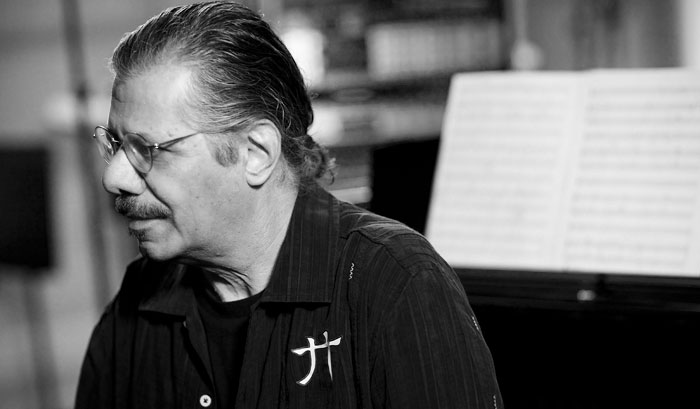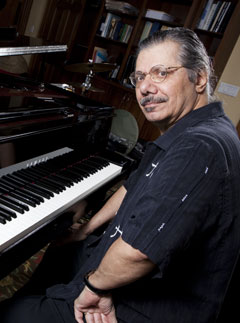


Composer, keyboardist, and bandleader Chick Corea is one of the most important figures in jazz history. From his groundbreaking 1960s sideman work with Stan Getz, Sarah Vaughan, Dizzy Gillespie, and Miles Davis, through his stewardship of the long-running groups Return to Forever, Akoustic Band, and Elektric Band, Corea has ceaselessly pushed boundaries. His vast discography encompasses high-energy fusion, intimate traditional jazz, and collaborations with many of the world's finest players.
Along with his friend and sometime collaborator Herbie Hancock, Corea is largely credited with popularizing electronic keyboards in jazz. Yet he's also famed for his solo acoustic piano recordings, starting with 1971's seminal Piano Improvisations, Vol. 1 and Vol. 2. We caught up with Corea shortly before the start of a world tour featuring many solo piano dates.

How has your approach to solo piano changed over the years?
It hasn't, really. For me it's always been a process of stripping away layers of thought, layers of analysis, and just sitting down to play. Solo piano is how I generate ideas. It's my "creation machine."
How does it differ from playing with others?
When I'm co-creating, I immerse myself in the other person's world, in their abilities and creativity. That's a joy to do! But when I'm by myself, I don't have that mirror to bounce off of, so I'm left to my own devices. It gives me an assessment of my strengths and my weak points, and helps me know how to make the next steps of improvement.
Weak points? What weak points?
That's between me and myself, man! [Laughs.] I just get onstage and try things. I have a concept, I go for it, and I find out what I can and can't do. And then I work on the things that I would like to accomplish, but am not yet adept at.
You've created projects around the music of such piano influences as Thelonious Monk, Bud Powell, and Art Tatum, yet there's never anything "retro" about your playing.
Well, I don't see music in terms of chronology, or what's old or new. Say I put on a recording of Vladimir Horowitz playing Scarlatti. Scarlatti wrote the notes hundreds of years ago, and Horowitz recorded them forty years ago, but they're here now in present time. Time is the great red herring, the great misdirector. It leads you down paths without answers. If I play something by Scarlatti, or by Bill Evans, or that my daughter wrote for me last week, or that I improvise on the spot, it's all music in present time.
Another hallmark of your style is your ability to veer from complex pieces to songs of childlike simplicity.
Every artist tries to condense things in one way or another. We all look for that poignant simplicity. I often find that if I keep working on a particular song, I move through complexities and variations, and finally arrive at some simple thought that summarizes everything I'm trying to do.
Solo piano is how I generate ideas. It's my 'creation machine.'
You recently checked out a Yamaha AvantGrand piano.
Oh, yeah. The Yamaha R&D guys are trying to burst the illusions of the physical universe, and they're succeeding! Now, I've been a cynic about digital pianos. They're practical and useful, but the idea of any of them replacing a great concert grand has always been unthinkable. So when I saw the Avant, my first thought was, "Oh, here we go again." Sure, it looked pretty -- the wood quality and design are like a work of art. But when I turned on the Avant and started playing, it won me over. It's got built-in speakers placed in such a way that it disperses the sound acoustically just like a grand piano does. After about twenty seconds I'd gotten over the fact that it was an electric piano and was under the delusion that I was playing an acoustic piano, with the same kind of nuance, expression, and rapport. So it's the best technical advance I've seen so far.
You were exposed to jazz at an early age.
Yeah. My dad was a trumpeter. He loved Miles Davis and Dizzy Gillespie, and he had a pretty nice little collection of 78 RPM vinyl. My mom and dad were proud of me, and they were by my side all the way until they passed away. The musicians that I work with all loved my folks. My mom still has a rep amongst the musicians who remember the dishes she served.
So all these years later, what are your thoughts about encouraging young people in music?
For anyone pursuing art or music, my one major piece of advice is this: Follow your own likes and dislikes, and stay true to them. Ignore any outside evaluations that don't suit them, because art isn't about outside evaluation. To me, the payoff for life is being able to take pleasure in creating something that you like, that others like, and that you take joy in making. That's what makes life a rich thing to live.
(Photography Credit: Will Hawkins)
























